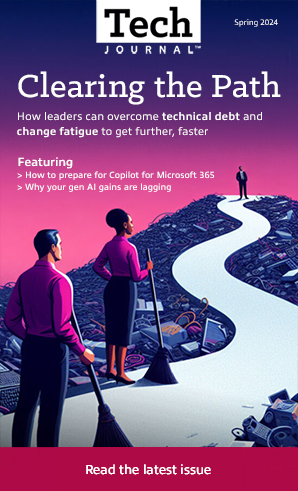Article It’s Time to Build a Smarter Supply Chain
AI, automation, blockchain and more will optimize and streamline your supply chain management.
By Insight Editor / 23 Nov 2023 / Topics: Artificial Intelligence (AI) Intelligent edge

Retail supply chains are complex, multifaceted systems — they’re also severely disrupted. Three years after the pandemic, supply chain disruption is still a major concern for the industry. COVID-19 led to factory shutdowns, logistics delays and border closures, resulting in a significant impact on the global economy as a whole.
And the pandemic isn’t the only disruptor. Labor shortages, port congestion and natural disasters like hurricanes and wildfires have exacerbated existing issues. Many retailers are being pressured to create more resilient and agile supply chains for the future, but with so many moving parts, overhauling your Supply Chain Management (SCM) can be difficult, costly and let’s face it: a little intimidating. Retail depends wholly on the flow of products, and you want to get it right.
That’s where we come in. Our retail experts are continuously monitoring the industry to stay up to date on the latest advancements and tune in to the best technology strategies.
In this article, we’ll take a closer look at the challenges facing supply chains today and the technology that can build a better system.
Current supply chain challenges include:
Lack of visibility
Many retailers struggle with poor visibility across their supply chains. This can lead to several issues, including delays, stockouts, decreased customer satisfaction and wasted resources.
Manual processes and inefficiencies
Paper-based, manual or outdated processes create inefficiencies throughout the supply chain, slowing operations and reducing accuracy.
Inventory management
Maintaining inventory levels is a major challenge, especially when your business works with a variety of suppliers. Stockouts impact sales and often reduce customer loyalty.
Poor communication and collaboration with suppliers
Communication breaks down all too often in the supply chain, leading to miscommunications, delays and lost or damaged goods.
Sustainability
Consumers have become increasingly aware of environmental and ethical concerns associated with the supply chain. Retailers are being called on to address these issues and implement sustainable processes in their business operations.
The impact of omnichannel retail
One of the biggest movements in retail may also be one of the biggest supply chain stressors.
Modern retail is all about omnichannel. And omnichannel is all about the now. As customers shop across platforms, retailers must be able to deliver products and services when, where and how the customer wants them. These cross-channel strategies result in rapid growth of the marketplace, and — as you can imagine — additional stress on the supply chain.
Shoppers want a seamless, convenient purchasing experience, no matter which channel they’re shopping on. To meet these demands, retailers need real-time visibility into their inventory and fully-integrated systems to ensure a smooth process for customers. The right technology can make all the difference.
What are supply chain leaders saying?
According to a CNBC survey, “more than half of logistics managers at major companies and trade groups say they do not expect the supply chain to return to normal until 2024 or after.” 61% of respondents said their current supply chain is not operating normally.
Respondents were also asked when they expect to see a return to normalcy. 30% said in 2024 — but another 29% said 2025 or after, or never.
Though this sounds dire, it’s just another reason to adopt the latest technology now. This may be our new normal, but technology can help you stay functional and competitive amid disruption.
Latest innovations in supply chain technology
Our recent retail ebook touched on the importance of digitizing your supply chain in 2024. Digitization includes replacing manual or analog processes with digital technologies to optimize and streamline the supply chain. The result? You’ll enjoy better analytics, transparency, tracking and lead times.
Let’s look at solutions to streamline your SCM:
AI and machine learning to automate processes:
AI-powered systems can accurately predict demand, monitor inventory levels and streamline logistics processes. These systems also enable automation, reducing human errors and increasing efficiency across the supply chain.
- According to a report from Retail Week, supply chain priorities are shifting toward automation and AI. While 2022 priorities included upskilling and reskilling existing staff and hiring more logistics employees, the 2023 report found these top concerns replaced with warehouse automation and AI implementation.
Cloud-based inventory management systems:
Cloud-based inventory management systems provide retailers with real-time visibility into inventory levels, reducing the risk of stockouts and improving accuracy. A cloud-based system also allows for remote access, enabling your team to access your inventory management system from anywhere at any time.
IoT sensors and RFID tracking for better visibility:
The Internet of Things (IoT) provides real-time insights into supply chain processes through sensors and Radio Frequency Identification (RFID) tags. This helps businesses track goods, monitor delivery status and identify bottlenecks in real time.
- Adidas implements RFID for real-time product tracking.
In 2023, Adidas announced an RFID tag solution to simplify item tracking throughout their supply chain. RFID tags use radio frequency to transfer data and track or identify objects, and according to RFID Future, Adidas developed its own tag solution featuring NFC (Near Field Communication) technology. Adidas shoppers can use their phones or other NFC-capable devices to scan the tags and access product information like pricing, availability, size and color.
Not only is this beneficial for Adidas customers — it also gives the company more accurate, up-to-date information on inventory levels, fulfillment times and more.
Supplier collaboration tools:
Supplier collaboration tools enable retailers to communicate with suppliers, streamline processes and reduce delays. These tools make it easier to manage orders, reduce lead times and improve overall efficiency.
Blockchain technology for supply chain traceability:
Blockchain technology can be used to track products from end to end to ensure ethical and responsible sourcing. This transparency fosters trust between consumers and retailers, providing a competitive edge in an ever-changing market.
Optimize your SCM with Insight
The retail supply chain can be a challenging space, but modern technology makes it easier to stay competitive — and the right technology partner can simplify the entire process. With our expertise in retail technology, you can focus on the bigger picture while we identify supply chain solutions tailored to your unique needs.







